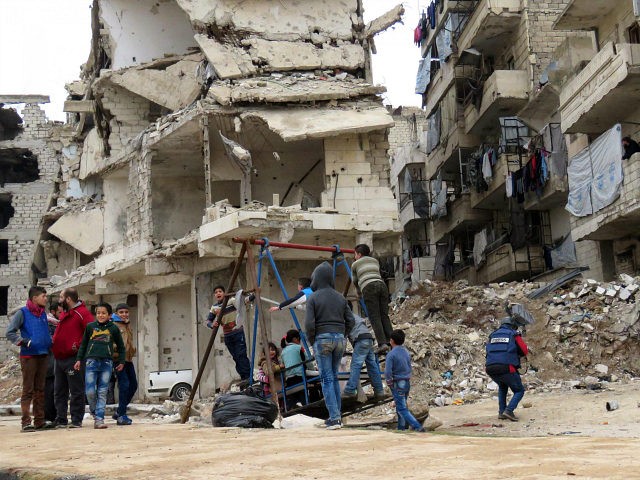Russian President Vladimir Putin announced on Thursday that a ceasefire between the Syrian government and opposition forces, brokered and guaranteed by Russia and Turkey, would go into effect at midnight.
Syrian state media confirmed the Assad regime’s participation in a “comprehensive nationwide cessation of hostilities as of midnight,” made possible by the “successes achieved by the Armed Forces.” This was taken as a reference to the eviction of rebel forces from the long-besieged city of Aleppo.
Putin said the ceasefire would be followed by peace talks in Kazakhstan at an unspecified future date, hosted by Russia, Turkey, and Iran, according to the Associated Press.
At least one rebel commander seems to think this ceasefire will work out better than the previous two, telling the Associated Press, “This time I have confidence in its seriousness. There is new international input.”
By that, he means Russia and Turkey are running the show without interference from the United States or United Nations, neither of which is part of the deal.
The Syrian National Coalition, one of the major opposition groups, informed the AP via text message that the “moderate rebels” of the Free Syrian Army would abide by the ceasefire, although they reserved the right to retaliate against attacks by the Syrian government or its allies.
Reuters adds that it was told by several other rebel groups that they would respect the ceasefire agreement.
“The agreements reached are, of course, fragile, need a special attention and involvement,” Putin said. “But after all, this is a notable result of our joint work, efforts by the defence and foreign ministries, our partners in the regions.”
He also announced that Russia would begin reducing its military deployment in Syria.
“With this agreement, parties have agreed to cease all armed attacks, including aerial, and have promised not to expand the areas they control against each other,” the Turkish Foreign Ministry added.
As with previous ceasefire agreements, this one excludes the Islamic State and other terrorist groups … with one very notable exception: Nusra Front. Al-Qaeda’s franchise in Syria is included, under the new name it chose for itself last year, Jabhat Fateh al-Sham.
Several rebel leaders said the Syrian government and its allies wanted to exclude the al-Qaeda group from the new deal, but other rebel factions insisted upon their inclusion because they control so much territory. The way these rebel leaders portrayed the ceasefire, only ISIS is completely excluded.
“We saw recently how Aleppo was annihilated because of 200 fighters from Jabhat Fatah al-Sham. This is a fundamental condition for us that no group is excluded be it Fatah al-Sham or not,” said Mamoun al-Haj-Mousa, a member of the Free Syrian Army’s political council. In other words, he’s a high-ranking official from the top “moderate” group the Obama administration viewed as America’s indispensable allies in Syria.
These developments are an utter disaster for Obama’s Syria policy – or else a big success, if the goal of those policies was to humiliate the United States and eliminate American influence in the Middle East. Russia, Turkey, and Iran are openly stating they’re shoving the U.S. aside to take decisive action on the Syrian crisis, thus cementing the Damascus-Moscow view of the Syrian civil war as a terrorist horror the Obama administration unnecessarily prolonged by supporting the wrong side.
To drive that point home, Reuters quotes Russian Foreign Minister Sergei Lavrov saying the U.S. would be allowed to join the peace process sometime after President-elect Donald Trump takes office.
There are still some major disagreements between Russia, Iran, Turkey, and the Assad regime to be worked out, let alone whatever the rebel factions demand once peace talks begin in earnest.
Turkey wants all foreign forces out of Syria, with Foreign Minister Mevlut Cavusoglu specifically mentioning Iran’s proxies, Lebanese Hezbollah. Iran may want those forces to remain in place, as enforcers of Iranian influence in a newly divided postwar Syria.
Turkey is also extremely upset by U.S. support for Kurdish forces in Syria. The United States has long supported the Kurdish YPG militia as front-line proxy forces against the Islamic State, while Turkey views them as terrorist allies of the Kurdish separatists in Turkey.

COMMENTS
Please let us know if you're having issues with commenting.